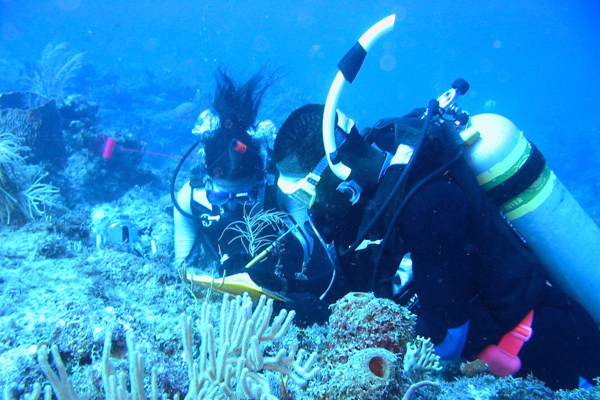Mission 31 to splash down on June 1

Nine miles off the coast of Key Largo, Fla., and 63 feet beneath the waves lies the world’s only underwater research lab: Aquarius. “There’s no place like it on earth,” said Mark Patterson, professor of marine and environmental science and civil and environmental engineering at Northeastern University, who has visited and lived within the “habitat” 10 times.
In the years it has been submerged, Aquarius has intimately assimilated into the coral reef nearby. Sponges and corals decorate the exterior and a 700-pound grouper has taken up residence underneath. Inside, it’s a veritable underwater apartment complex complete with kitchen, sleeping quarters, and Wi-Fi.
“It’s like a miniature city immersed in the environment,” said Brian Helmuth, a professor of marine and environmental science and public policy at Northeastern’s Marine Science Center, which is located on a peninsula at historic East Point in Nahant, Mass.
Focused on urban coastal sustainability, the MSC researchers have a strong interest in understanding deeply integrated human-ocean systems such as Aquarius. Operated by Florida International University, the habitat will become home to a team of aquanauts—including Helmuth—beginning on June 1 for a 31-day expedition, aptly named Mission 31. Fabien Cousteau, grandson of Jacques-Yves Cousteau, the famed ocean explorer and creator of the first ocean floor habitats for humans, will spearhead the mission in honor of the 50th anniversary of his grandfather’s Conshelf Two mission.
“The overarching theme for Mission 31 is the human-ocean connection within the lens of exploration and discovery,” Cousteau said.
Northeastern will take the lead as scientific partner during the second half of the mission, when Helmuth will begin his two-week-long submersion. The expedition aligns with Northeastern’s focus on solving global challenges in sustainability, one of the university’s core research themes.
The extended length of the dive allows the aquanauts to “saturate,” meaning the gases inside their bodies equilibrate with the surrounding high-pressure environment. This allows for more in-depth, long-term research investigations not normally permitted during the standard hour-long dives, which require a period of depressurization or “offgassing” in order to prevent serious illness.
As part of Mission 31, Northeastern will pursue four main research projects all centered on the theme of coral reef ecology in the context of global change. Helmuth will be underwater with Aquarius for two full weeks, while the rest of the Northeastern team—which includes Patterson, three graduate students, and two research technicians stationed “topside”—will be conducting shorter-term dives throughout that same period. In addition, Stephen W. Director, Northeastern’s provost and senior vice president for academic affairs, will dive to Aquarius to visit Helmuth and the rest of the Aquarius team. Director’s dive will be streamed live to the Boston Museum of Science, part of an ongoing educational outreach component of Northeastern’s part of the mission.
In the first research project—part of an existing National Science Foundation grant to Patterson’s lab—the Northeastern team will create electrical models of two different types of coral bodies and their respective responses to stress. Data will be collected throughout the two-week-long stay at Aquarius.
Secondly, the team will be collecting “pea-sized” tissue samples from 14 coral species for the Ocean Genome Legacy, Northeastern’s partner and a publicly accessible biorepository of DNA samples from ocean species around the globe that is now located at Northeastern’s Marine Science Center.
One of those species, the barrel sponge, can live for more than two millennia and is the focus of a third project, which will be led by Patterson’s and Helmuth’s labs. The researchers will use state-of-the-art monitoring instruments to track the flow of energy through the sponges in order to examine the non-lethal effects of climate change on the organism.
In the fourth project, the team will collect specimens of zooplankton from throughout the water column 24 hours a day. Global change has been a primary driver of coral reef decline over the last half century, and many studies have shown that corals weather these effects better when they have access to food in the form of animal plankton. Currently, no good snapshot of zooplankton biodiversity in these areas has been gathered to establish a baseline for examining the effects of future global change on this species set.
“The Marine Science Center has a lot of experience in coral ecology,” Patterson said. “We’re a global university that is strongly focused on sustainability as evidenced by our Urban Coastal Sustainability Initiative. Here’s an important system to get long term data on the health of corals and coral reefs, which is obviously influenced by human actives on the land and sea.”